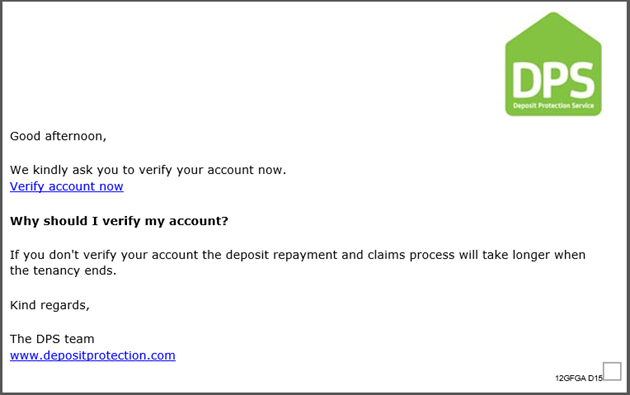Are you aware of scams involving fake emails?
Scammers regularly try and dupe our customers into parting with their deposit money through the use of fake emails. The fraudulent email will ask the recipient to take action with their DPS deposits, for example to verify their account, providing a link within the email to click on – do not click on this link. The fraudsters create a fake website to support the deception in an attempt to make the email appear official. We inform the relevant authorities as soon as we become aware of a fraud and any associated website is taken down. However, as is typical in these kind of scams, each time a fake website is shut down another will appear in its place, so please stay vigilant.
Not only do the scammers create fake websites, but they will also use fake email addresses, for example “Karen.dpscaseworker@gmail.com”. Follow the guidance below to help you tell the difference between a genuine DPS email and a fake.
The scam targets landlords as well as tenants, so all users of our website need to remain vigilant and protect their account details from the fraudsters.
How to spot the scam
This is an example of the type of email we see.

These emails are similar to genuine emails we send to users when an account is registered, asking the recipient to activate their account.
How to tell if an email is genuine
There are a few simple tips to help you identify if an email you’ve received is genuine.
Does receiving this email make sense?
We’ll only send you an activation email when:
- the landlord protects a tenancy deposit with us at the start of a tenancy
- someone starts the deposit repayment process at the end of a tenancy
- you’ve specifically asked us to send you an activation email for your account
If you aren’t currently starting or ending a tenancy, and haven’t asked us to send you an email, it’s unlikely to be real.
How are you greeted in the email?
When an account is created, we require the name and contact details for the landlord or tenant. We’ll always greet you using your first name.
Hover over the links the email is asking you to follow. Do they point to the DPS website – depositprotection.com? If they don’t then do not click them.
If you’re still not sure if an email has come from us, please forward it to us here and we’ll let you know if it’s genuine.
Staying safe online
Here’s a few tips:
- Keep your passwords secret
- Where possible, use passwords that include numbers, capital letters, lower case letters and symbols to make them more secure
- Don’t write passwords down or save them in your phone
- Take a good look at emails before clicking on any link – if it looks fake, or the offer sounds too good to be true, then think twice
- Tell-tale signs will be bad spelling or grammar and overly informal language (e.g. “finish the deal”)
- Fraudsters may also try to make you feel under pressure to do what they want, and will sometimes ask you to confirm information that they should already have